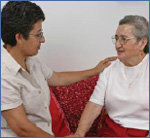For Family, Friends, and Caregivers
 Have you ever thought...
Have you ever thought...
“It’s hard to know what to do. When I try to talk to my friend about his drinking, he gets very upset and changes the subject.”
“I’m worried that my mother takes a lot of medicines and still drinks. But, I have no idea if her doctor knows this. How can I get her to talk to her doctor about her drinking?”
“Sometimes I think I shouldn’t say anything about my uncle’s drinking. Then something happens, like last week he fell and bruised his arm and face. I’ll bet he was drunk. How am I supposed to ignore that?”
You can’t force someone to get help, but here are steps you can take to help.
 Step 1: Talk.
Step 1: Talk.
- Talk about your worries when the person is sober. Try to say what you think or feel, like “I am concerned about your drinking.”
- Give facts. Some people find it helpful just to get information. You could say, “I want to share some things I’ve learned about older adults and alcohol.”
- Try to stay away from labels like “alcoholic.”
- Ask to go to doctor visits with your family member.
Step 2: Offer your help.
- Suggest things to do that don’t include drinking.
- Encourage counseling or attending a group meeting. Offer to drive to and from these support meetings.
- Give your support during treatment.
 Step 3: Take care of yourself.
Step 3: Take care of yourself.
- You need support, too. Think about what you need to stay safe and healthy.
- Involve other family members or friends so you are not in this alone. Talk honestly about how you are feeling. Try to say what support or help you need.
- Try going to counseling or special meetings that offer support to families and friends of people with drinking problems.
There may be programs such as Al-Anon at your local hospital or clinic. Al-Anon is listed in the white pages of your local phone book, or call 1-888-425-2666 to find a meeting near you.
Remember—you can’t make a person deal with a drinking problem. You can offer support and get help for yourself.
<< Back | Next >>
